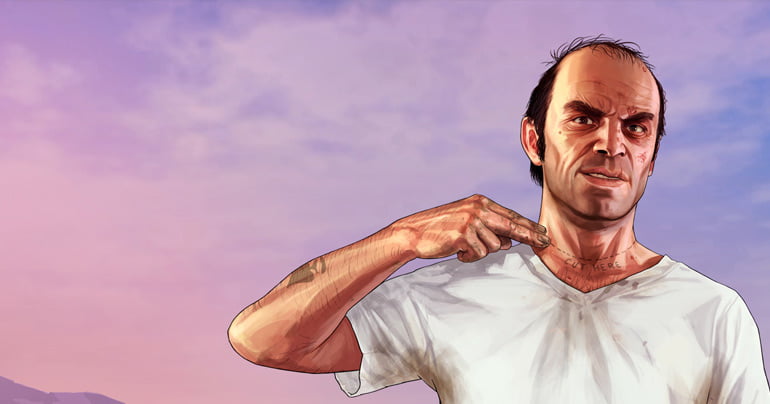I was driving home from a job in Broker, and had just crossed the Algonquin Bridge. The junction here is notoriously bad, but I expected to get back to my swanky penthouse pretty soon, excited to watch some TV after a gruelling day.
Predictably, the traffic was jammed up, snarling back from the junction all the way to the bridge itself. I’m a pretty patient guy, so I just fiddled with the radio knob, enjoying some LCD Soundsystem and some Nas. But by then, ten minutes had gone by, and the traffic still hadn’t moved. Even in a city with congestion problems as bad as Liberty City, this was unusual. So I got out of the car, conscious that I’d look like an idiot if the traffic started moving again, and walked down the street to investigate.
On the way, a driver in an SUV swerved into me, despite being stuck in traffic.
I was knocked to the floor. The driver’s swerve carried him into the car in front. No one really seemed to mind though; arbitrary crashes are par for the course in Liberty City.
When I had picked myself up from the floor and brushed down my expensive Perseus suit, I proceeded to the front of the traffic jam. There I saw about ten cars stuck in the middle of the junction, not moving. There hadn’t been a crash: they’d just got confused and stopped.
It didn’t look like they were going to move any time soon, so I weighed my options. Would it be more ethical to try and move my car dangerously, either driving on the sidewalk or reversing down the bridge? Would it be too unethical to leave it there unattended, an impediment to future conscientious road users?
In the end I walked home. By the time I arrived it was dark, and my cousin Roman had already gone out for dinner.
–
These are the day-to-day problems I’ve encountered trying to play Grand Theft Auto IV as a responsible, moral citizen. Rockstar’s game is oppressively misanthropic and bleak, and I wanted to introduce my own ray of sunshine. After all, nothing was ever going to change if all I did was complain about things. I was bored of driving dangerously between far-flung locations in order to murder various groups of petty thugs. Now I was a rich man, despite Niko’s continued assertions that ‘he really needed money.’ I had everything I could desire: $500,000 spending money; a beautiful penthouse apartment on the Upper East Side, and less beautiful property in Alderney City and Bohan; the finest clothes I could buy; and an arsenal of deadly and well-maintained weapons.
Now I’d lost interest in murder, there wasn’t really anything left for me in Liberty City. I came to a profound personal realisation: the money had always only been an excuse, a surrogate. I’d said I was killing for the money, stealing for the money, occasionally running down innocent citizens, or catching them in a crossfire, or traumatising them with a public bombing, because I needed the money. This was my right as a freedom loving American; this was my pursuit of happiness.
But really, I was killing because I liked killing, and when I didn’t like killing anymore, there was nothing else to do.
–
I suppose the most beautiful thing in the world is to fall in love. So I tried. I went out with this girl called Kate. She was Irish-American, solid crime family stock, but without the immoral staining of her brothers, who I did jobs with occasionally. In cut scenes, we seemed to get on; there were some awkward, fumbled glances, lingering eyes, once the brush of her blouse as she passed me in the corridor.
So I took her out. Kate confessed that she didn’t get to go out much, and I was happy to take her. I could imagine life with her brothers was challenging, and I thought she’d welcome some relief. We went to an expensive, hip club in Algonquin, and drank and danced until well after dawn. At least I think we did: I blacked out as soon as we got to the club, and only regained consciousness as we left, blinking in the glare of the rising sun as it hung majestic between skyscrapers, illuminating our night of presumed decadence. I presume decadence because I couldn’t walk very well; certainly I was in no state to drive.
I’ve always had something of a hatred of taxis, so I opted to take Kate home using public transport. We walked a block or two, stumbling and giggling, to get onto the subway. We got to the platform and waited for the train, which came very swiftly. We boarded and slumped down, glad to let public transport do the work our legs were no longer fit for.
After a short journey across the river, we got off the train near to Kate’s house, and started to walk. We walked and walked a little bit more. We’d walked about three blocks. Kate was starting to get antsy. We walked another block. Kate snapped. ‘You don’t know how to treat a woman!’ she shouted. ‘This has been a horrible evening!’ I was confused. I’m used to being spurned by women, but not after dates that have gone well. Kate stormed off, and I walked the next block back to her house alone, wondering what had gone wrong. To this day, I don’t really know.
My best guess is that Kate couldn’t bear to walk home. Or, more accurately, my best guess is that the programming for Kate specified mission failure if she didn’t get home within a certain time period. And, unfortunately for law-abiding public transport lovers like me, this time period was shorter than the length of a subway journey to Kate’s house. Sometimes being a good guy doesn’t pay off.
–
So this is my major problem with GTA. I started playing Grand Theft Auto IV again after reading the hype for Grand Theft Auto V, which I saw described somewhere as ‘the moment where video games found their storytelling maturity.’ Other reviews detailed the enormous world, profoundly full of things, thriving ecosystems and subcultures, activities and secrets. Playing it would be like living in a real city where you could do whatever you wanted. It sounded great, but it didn’t sound like the GTA game I owned.
And you know what? I was right. It wasn’t like the GTA game I owned. GTA offers you choices, apparently. But really it doesn’t. You can’t approach missions in different ways, you can’t progress without doing missions, you can’t really have fun without doing at least a few of the missions. You can’t get around without a car, and you can’t get a car without stealing it. You can’t drive your car around without breaking traffic laws.
At first I tried to interpret this charitably. The first line of defence for GTA has always been that it’s a satire. As if using a fancy, high-cultural sounding word will give it more weight.It’s a glorious cartoon, an exhilarating, insightful and provocative attack on modern America. Maybe, I thought, the impossibility of acting morally, the way the game makes moral actions seem unpleasant and buzz-killing, is part of the satire. Maybe the gameplay is itself mimetic of the problems of America. The horror of driving in a major city leading to killing sprees. The banality of modern dating leading to helicopter theft, the only remaining outlet for thrills. The sheer depersonalising depression of modern life, the impossibility of making an emotional connection with anyone or anything, causing you to fall back on hyper-individualism, on rampant selfish greed, on a hedonic calculus where the only variable is your own fun. And the inevitable result of such a philosophy — the philosophy of modern America — is that individuals will cry for help. And in the world of GTA, the way you cry for help is escalating a hit and run incident into a large scale chase with helicopters and boats and armoured cars where you rocket-launcher the police until you finally fall, heroically, your police pursuit star rating maxed out, having received the attention you always wanted and needed.
The reason I don’t think all of these features are part of GTA’s mimetic satire though is very simple: right after the glorious end, you wake up again in hospital, basically fine, with nothing to do but do it again, like some awful cross between Groundhog Day and Pulp Fiction, if both films were shit. Your actions are meaningless.
Satire — caustic, devastating satire — is profoundly moral. It savages its target because it wants to make something better. Look at Swift, who unfortunately gets dragged into GTA debates around about this point. Could anyone who’d actually read Swift seriously defend the idea that GTA is a Swiftian satire? That it identifies specific abuses and tries to correct them? Swift has his misanthropic periods, to be sure, like all those shenanigans with horse-people and shit-flinging yahoos, but to say that humanity is base is not to say that humanity is irredeemable. Glittering satire is itself a monument to the fact that humanity can be redeemed, because it is great art. Look at Pope’s The Dunciad: a poem about the dire state of modern poetry. Most of it is about rival poets diving into pools of shit. The shit-poets are now gone, the dunces forgotten, but Pope remains, and Pope’s art remains.
Then you have GTA. GTA is irredeemable. It hates everyone and everything. It ‘satirises’ liberals and conservatives, rich and poor, men and women, gangsters and police. All are morally equivalent in its putrescent world. There is not even the redemption of art.
Video games can be art, but GTA is not. It’s badly written, inspiring limited emotional engagement with its thin, episodic story and characters drawn from a picture-book of stereotypes. The ‘satiric’ world could be justified if there was some kind of privileged perspective that offered a glimmer of hope. Niko’s eyes are there to scorn everything around him, Swiftianly, but Niko is just as much an object of scorn, just as much a psychopath as everyone around him, just as much of a cunt.
Rockstar drag you down into the mire of Liberty City, whether you want it or not. Perhaps this is their satire: that the Daily Mail has been right all along, that GTA is an agent of moral corruption. Or perhaps the satire is that a multi-billion dollar media company still haven’t managed to hire a decent writer.






